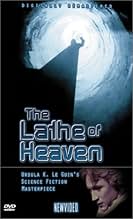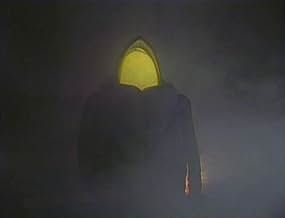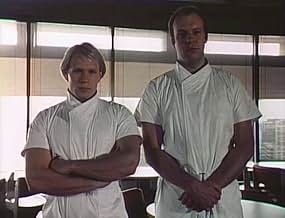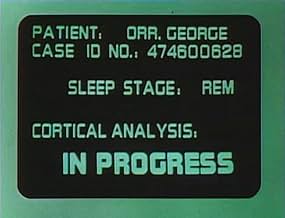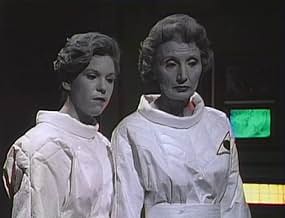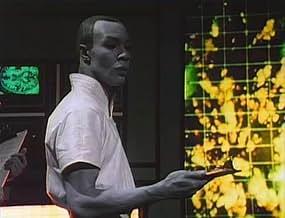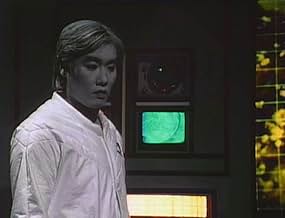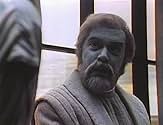The Lathe of Heaven
- Film per la TV
- 1980
- 1h 45min
VALUTAZIONE IMDb
7,1/10
2921
LA TUA VALUTAZIONE
Aggiungi una trama nella tua linguaIn a highly controlled and overpopulated society, a man who has terrifying dreams that affect reality is assigned a psychiatrist who takes advantage of the situation.In a highly controlled and overpopulated society, a man who has terrifying dreams that affect reality is assigned a psychiatrist who takes advantage of the situation.In a highly controlled and overpopulated society, a man who has terrifying dreams that affect reality is assigned a psychiatrist who takes advantage of the situation.
- Regia
- Sceneggiatura
- Star
- Premi
- 1 candidatura in totale
Peyton E. Park
- Mannie Ahrens
- (as Peyton Park)
James Bodean
- Guard
- (non citato nei titoli originali)
John Rainone
- The Grey Person
- (non citato nei titoli originali)
Ben Stephenson
- Scientist
- (non citato nei titoli originali)
Recensioni in evidenza
The world of literature lost one of its finest writers with the death of Ursula Le Guin this year (2018) at the age of 88. She was one of my heroes. Her writing is humane, wise, and penetrating, and she followed no 'school', no ideology, no fashion. I write for a living too (though it's writing of a very different kind), and if I could write just one page, even one paragraph that would live up to her standards, I'd be proud of it the rest of my life.
Well, anyway: The Lathe of Heaven is one of her SF novels and probably my favorite among them. It's a singular vision that stands alone in her own work, and in fact I can't think of any other novel to easily compare it with by anything else in SF either. It belongs vaguely to an alternate-worlds genre, but with differences. Not all that long after it was written, this movie adaptation was done for original TV broadcast, so it has a low-budget feel to it, and the lead actors (Bruce Davison, Kevin Conway, Margaret Avery) weren't all that well known at the time. It's even in black and white format. But put all that aside: it actually stays pretty close to the Le Guin storyline, unlike the inferior 2002 adaptation that strayed off the path. It's such a great story and so easily translatable to the screen for today's SF-familiar audiences that you can easily imagine a much bigger-budget superb production being done now complete with advanced CGI that would do justice to the hero George Orr's world-changing visions.
George Orr (Davison) is a perfectly ordinary, nice, low-key guy except for one thing: when pressed into it, he has "effective dreams" that change reality and rewrite history. He doesn't want to do this, but gets taken advantage of by psychiatrist William Haber (Conway) who uses George to enable his own altruistic but power-hungry goals. George's torturous journey through one history after another and eventual resolution are the substance of the movie.
This production disappeared for a long time after its original airing, but finally now you can see it on YouTube. Well worth it.
Le Guin's stories haven't generally been served well on movies and TV but so much better could be done with them. The Earthsea fantasy books are on a level with Narnia and Tolkien and they would work brilliantly if well produced. The recent TV production of them turned out to be a travesty. So would others of her SF novels like City of Illusions, Planet of Exile, or The Left Hand of Darkness (well, maybe that last one would be best as an indie film.) Hollywood is missing a bet.
Well, anyway: The Lathe of Heaven is one of her SF novels and probably my favorite among them. It's a singular vision that stands alone in her own work, and in fact I can't think of any other novel to easily compare it with by anything else in SF either. It belongs vaguely to an alternate-worlds genre, but with differences. Not all that long after it was written, this movie adaptation was done for original TV broadcast, so it has a low-budget feel to it, and the lead actors (Bruce Davison, Kevin Conway, Margaret Avery) weren't all that well known at the time. It's even in black and white format. But put all that aside: it actually stays pretty close to the Le Guin storyline, unlike the inferior 2002 adaptation that strayed off the path. It's such a great story and so easily translatable to the screen for today's SF-familiar audiences that you can easily imagine a much bigger-budget superb production being done now complete with advanced CGI that would do justice to the hero George Orr's world-changing visions.
George Orr (Davison) is a perfectly ordinary, nice, low-key guy except for one thing: when pressed into it, he has "effective dreams" that change reality and rewrite history. He doesn't want to do this, but gets taken advantage of by psychiatrist William Haber (Conway) who uses George to enable his own altruistic but power-hungry goals. George's torturous journey through one history after another and eventual resolution are the substance of the movie.
This production disappeared for a long time after its original airing, but finally now you can see it on YouTube. Well worth it.
Le Guin's stories haven't generally been served well on movies and TV but so much better could be done with them. The Earthsea fantasy books are on a level with Narnia and Tolkien and they would work brilliantly if well produced. The recent TV production of them turned out to be a travesty. So would others of her SF novels like City of Illusions, Planet of Exile, or The Left Hand of Darkness (well, maybe that last one would be best as an indie film.) Hollywood is missing a bet.
I had public television on several days ago (March 10, 2001) and "Lathe of Heaven" was starting on their series "Movies Worth Taping". I'm glad I happened to turn the TV on, as it was a movie well worth watching! It was made in 1987 as the first made-for-public-TV film, and is based on a novel by Ursula Le Guin.
This movie explores the notion of "effective dreaming", where one's dreams actually come true. It explores the strange dreams of George Orr (Bruce Davison). When he has these dreams, he wakes to find that his dreamt-up situations are now not only reality, but other people suddenly have adapted as if this reality has been with the world for some time.
George is traumatized by these dreams, and seeks the help of Dr. William Haber (Kevin Conway). Dr. Haber's intentions are good, to harness the power of these effective dreams to the betterment of the world, but he clearly abuses the doctor-patient relationship and hypnotizes George to have specific kinds of dreams. One motto of this film might be "be careful what you dream about"!
I found the special effects sometimes interesting, but often heavy-handed and not so smoothly executed. The setting, sometime in the near future in Portland, Oregon, was inexplicably dreary, beyond the rain that the city is well known for. The character development could have been stronger, with ancillary characters like Dr. Haber's secretary and the very few others seeming to be made out of cardboard and lacking emotion. George and Heather LeLache (Margaret Avery), however, enjoyed more solid and believable depictions.
In spite of these criticisms, the film was an exciting journey into inner space that indulges us to think about deep philosophical questions. What is reality? Are there parallel realities? What is or should be knowable about the nature of existence (to me reminiscent a bit of "2010", one of my favorite science fiction films)? What happens if we dream each other into or out of reality? "The greatest good for the greatest number" or rights of the individual? Can we design a utopia or will we be doomed to experience accidents we never considered that render such a proposed utopia much less than ideal? "The Lathe of Heaven" doesn't have the fresh and exciting visual effects of earlier science fiction films like "2001" or later ones, but is an interesting film that is a must see for science fiction fans.
This movie explores the notion of "effective dreaming", where one's dreams actually come true. It explores the strange dreams of George Orr (Bruce Davison). When he has these dreams, he wakes to find that his dreamt-up situations are now not only reality, but other people suddenly have adapted as if this reality has been with the world for some time.
George is traumatized by these dreams, and seeks the help of Dr. William Haber (Kevin Conway). Dr. Haber's intentions are good, to harness the power of these effective dreams to the betterment of the world, but he clearly abuses the doctor-patient relationship and hypnotizes George to have specific kinds of dreams. One motto of this film might be "be careful what you dream about"!
I found the special effects sometimes interesting, but often heavy-handed and not so smoothly executed. The setting, sometime in the near future in Portland, Oregon, was inexplicably dreary, beyond the rain that the city is well known for. The character development could have been stronger, with ancillary characters like Dr. Haber's secretary and the very few others seeming to be made out of cardboard and lacking emotion. George and Heather LeLache (Margaret Avery), however, enjoyed more solid and believable depictions.
In spite of these criticisms, the film was an exciting journey into inner space that indulges us to think about deep philosophical questions. What is reality? Are there parallel realities? What is or should be knowable about the nature of existence (to me reminiscent a bit of "2010", one of my favorite science fiction films)? What happens if we dream each other into or out of reality? "The greatest good for the greatest number" or rights of the individual? Can we design a utopia or will we be doomed to experience accidents we never considered that render such a proposed utopia much less than ideal? "The Lathe of Heaven" doesn't have the fresh and exciting visual effects of earlier science fiction films like "2001" or later ones, but is an interesting film that is a must see for science fiction fans.
I thought this was one of the best science fiction movies of all time. I thought the story was thoughtful, inventive and very, very interesting. I have since thought that this might be some sort of collective unconscience view of how the world is created and maintained by God and that mankind being a part of God is aware of this concept. (Or maybe I'm just reading too much into the movie.) In any case, I would very much like to see this movie come out on video tape so that I might buy a copy. I've got my fingers crossed. My review of the movie is "WAY TO GO!!"
Last night I got a chance to see one of my favorite SF movies, and it only took 20 years.
Back in 1978, I was working at a mom-and-pop bookstore in Dallas called Taylors. One day one of the customers bought a book by Ursula K. LeGuin: "The Lathe of Heaven". I told her that she was one of my favorite authors, and that I loved the book. She said that she was involved in the production of a film of the book that was to be done locally.
Early in 1980 it was aired. Bruce Davison (recently the Senator in "X-men") played the protagonist, George Orr. And various Metroplex locations stood in for Portland in the near-future year of 2002. City Hall (later the OCP HQ in "Robocop"), Reunion Arena and the Water Gardens in FW (previously used in "Logan's Run").
George Orr has a problem: dreams. He doesn't want to have any. He takes drugs to try and thwart his unconscious so that he can sleep but not dream. Because if he does dream a special kind of dream, an "effective" dream, it changes reality "all the way back to the Stone Age".
Dr. William Haber is an oneirologist: a dream specialist. He doesn't believe George's story, of course. He thinks that George is sick, not cursed. He eventually comes around to the realization that George is right. A power struggle ensues to decide who will be in charge of deciding who gets to make the decisions of how to use this power.
The story touches on race relations, psychology, Taoism and more. And all on a miniscule budget of 250K.
An added bonus was the addition of interviews with Bruce Davison and Ms. LeGuin, the latter with Bill Moyers. She rarely does interviews, and it was wonderful hearing her add little behind-the-scenes details and commenting on the story and film. Since my understanding of Taoism is limited to readings of "The Tao of Pooh", I didn't realize the use of Taoism until I heard UKL mention it.
If I had had 90 bucks to blow on a KERA membership, I could have gotten the video from them. In fact, the on-air weasel said that the tape was "only available through public TV". If you check amazon.com, as I did last night, you will find that this is a bald-faced lie: TLoH will be released on VHS and DVD later this month, with the interviews and all.
The only thing that burned my butt about the film that I saw last night was the one change they made. Originally, they used Ringo Starr's version of the Beatles tune "A Little Help from My Friends". The new version has a different cover version. One of the reviews on amazon.com stated that this was because it would cost too much to get the rights from Michael Jackson, who now owns the entire Beatle catalog. This doesn't work. IMHO, MJ would get money no matter who did it.
Uncle Steve says check it out.
Back in 1978, I was working at a mom-and-pop bookstore in Dallas called Taylors. One day one of the customers bought a book by Ursula K. LeGuin: "The Lathe of Heaven". I told her that she was one of my favorite authors, and that I loved the book. She said that she was involved in the production of a film of the book that was to be done locally.
Early in 1980 it was aired. Bruce Davison (recently the Senator in "X-men") played the protagonist, George Orr. And various Metroplex locations stood in for Portland in the near-future year of 2002. City Hall (later the OCP HQ in "Robocop"), Reunion Arena and the Water Gardens in FW (previously used in "Logan's Run").
George Orr has a problem: dreams. He doesn't want to have any. He takes drugs to try and thwart his unconscious so that he can sleep but not dream. Because if he does dream a special kind of dream, an "effective" dream, it changes reality "all the way back to the Stone Age".
Dr. William Haber is an oneirologist: a dream specialist. He doesn't believe George's story, of course. He thinks that George is sick, not cursed. He eventually comes around to the realization that George is right. A power struggle ensues to decide who will be in charge of deciding who gets to make the decisions of how to use this power.
The story touches on race relations, psychology, Taoism and more. And all on a miniscule budget of 250K.
An added bonus was the addition of interviews with Bruce Davison and Ms. LeGuin, the latter with Bill Moyers. She rarely does interviews, and it was wonderful hearing her add little behind-the-scenes details and commenting on the story and film. Since my understanding of Taoism is limited to readings of "The Tao of Pooh", I didn't realize the use of Taoism until I heard UKL mention it.
If I had had 90 bucks to blow on a KERA membership, I could have gotten the video from them. In fact, the on-air weasel said that the tape was "only available through public TV". If you check amazon.com, as I did last night, you will find that this is a bald-faced lie: TLoH will be released on VHS and DVD later this month, with the interviews and all.
The only thing that burned my butt about the film that I saw last night was the one change they made. Originally, they used Ringo Starr's version of the Beatles tune "A Little Help from My Friends". The new version has a different cover version. One of the reviews on amazon.com stated that this was because it would cost too much to get the rights from Michael Jackson, who now owns the entire Beatle catalog. This doesn't work. IMHO, MJ would get money no matter who did it.
Uncle Steve says check it out.
I find it hard to believe that a film this popular is out of reach. This was one of the few films that leaves the viewer rethinking one's philosophy about the future, the past, the present, and human kind!! Did I dream it? Is there some strange power that prevents us from sharing it with others? Was it meant to be seen by a few chosen people who let it into their collective souls and minds? I'm not crazy! What if the Augmenter is at work here? Dream well tonight..under the other moons light..remember the lessons..reserved for our sight..it may be forever..or later tonight..that this films message..finally takes flight. Everyone who mentions this film feels changed at least a little by it. Lets find out if its meant to be seen again. We must stop the Augmenter and change the future. Lets see it again!! Ha! Dream on!!
Lo sapevi?
- QuizThe night that this was first broadcast, there was a major power outage in the Pacific Northwest, which meant that author Ursula K. Le Guin was unable to watch the film based on her own book on its first run.
- BlooperOn the government water distribution tanker truck, the word "mobile" is misspelled "MOBIL". Although, since this takes place in the future, it's possible the spelling has changed.
- ConnessioniFeatured in No Sleep TV3: Classic Episode #1: "Our All-Time Faves" (2015)
I più visti
Accedi per valutare e creare un elenco di titoli salvati per ottenere consigli personalizzati
Dettagli
- Data di uscita
- Paesi di origine
- Sito ufficiale
- Lingua
- Celebre anche come
- La rueda celeste
- Luoghi delle riprese
- Aziende produttrici
- Vedi altri crediti dell’azienda su IMDbPro
Contribuisci a questa pagina
Suggerisci una modifica o aggiungi i contenuti mancanti

Divario superiore
By what name was The Lathe of Heaven (1980) officially released in Canada in English?
Rispondi
